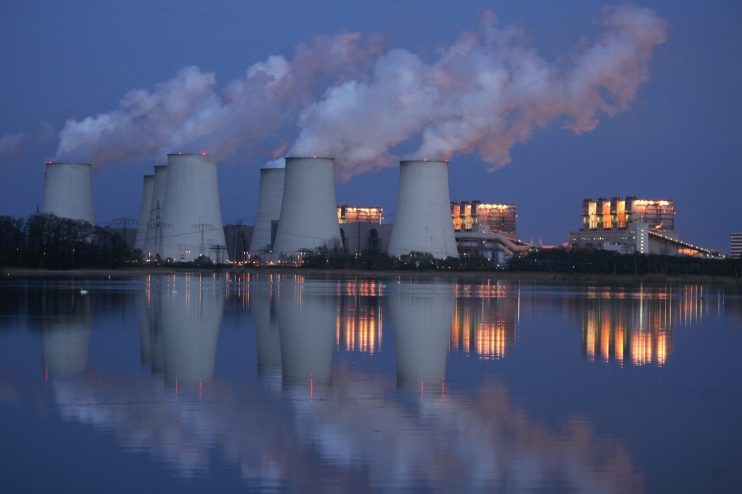‘Beast from the East’ forces National Grid to call for the firing up of four coal plants as cold snap hits the UK

National Grid has called for the warming up of four of the UK’s five contingency coal units ahead of a sustained cold snap, with temperatures set to drop below freezing across parts of the UK this week.
This could trigger a surge in demand while also lowering generation for renewable sources such as wind power.
Its electricity system operator (NGESO) has also issued an electricity margin notice – raising the prospect of a supply crunch if energy use surges.
The notice will be in place between 4.30pm and 10.30pm tonight, which means more supplies could be needed this evening to maintain the buffer between overall demand and the minimum spare supplies NGESO aims to keep available.
National Grid has to ensure it has enough electricity generators online when demand for electricity peaks, meaning it has to maintain a margin above forecast demand to deal with any short spikes.
Two units at Drax Power Station and two units at EDF’s West Burton Power A Station will be put on standby, in case they are needed to help meet household supply needs.
Five coal plants have been left operating this winter, in case needed in emergency conditions to manage supplies.
NGESO has confirmed the decision, and insisted electricity supplies were not at risk.
A spokesperson said: “NGESO has issued a notification that we will warm four of our five winter contingency coal units for potential use on Tuesday 7 March. This notification is not confirmation that the unit will be used on Tuesday, but that it will be available to the ESO, if required.
“NGESO as a prudent system operator has developed these tools for additional contingency to operate the network as normal. This does not mean electricity supplies are at risk.”

National Grid could turn to Europe
This is the fifth time NGESO has turned to coal in the face of pressure on operating margins this winter, but has previously stood down the last four orders.
Earlier this year, National Grid has previously asked suppliers to offer customers discounted bills in exchange for saving electricity during peak hours to reduce pressure on the UK’s creaking energy network – through what is known as the Demand Flexibility Service .
The service was utilised over two days last month on January 23 and 24 for the first time – although the need for a third day this month now appears to have been repealed.
Big Six supplier Octopus Energy has argued this could be an alternative to using coal as an energy source – even as backup source in times of supply shortages.

The DFS has paid out participating households and businesses across the country millions this winter for lowering their energy consumption when there is stress on the grid – typically in the evenings.
Alex Schoch, head of flexibility at Octopus, said: “National Grid’s new demand flexibility service is already offering a cheaper, more practical and sustainable solution to peaks in energy demand, while putting millions of pounds back into people’s pockets that would otherwise be paid to fossil fuel companies. Even during this cold snap, households can deliver the flexibility that’s needed, get paid for it and reduce costs for everyone.”
If supplies are put under more pressure tonight, the UK could end up relying on interconnectors for more power – which supply electricity via the continent, with an increasingly reassuring picture emerging of European supplies.
Cornwall Insight is now predicting that Europe is set to end the winter with record levels of gas reserves, raising hopes the energy crisis will not be repeated next winter.
It forecasts European gas storages end this winter between 45 to 61 per cent full, with an average of 55 per cent and could reach 88-100 per cent full by September 2023
This would be at the high end of historical outcomes and compares to the previous end of winter record of 54 per cent in 2020.

Having higher storage levels at the end of this winter will mean less refilling is required to meet the EU targets before the 2023-24 winter, boosting the security of energy supplies.
The level of gas storage in Europe at the end of winter will play a crucial role in determining whether Europe is past the worst of the energy crisis, or if 2023 will bring back high prices and supply concerns.
However, it does warn this outlook could change depending on multiple macrofactors such as Asian demand, US exports, Russian supplies and the weather.
Dr Matthew Chadwick, lead research analyst at Cornwall Insight said: “Forecasts for European gas storage levels going into next winter are considerably more positive than they were last Autumn. As the risk of gas shortages falls, many may take this to mean Europe is past the peak of the energy crisis, but I would advise caution. Any single factor can influence the pace and pattern of storage refill, and perhaps more pertinently, change the cost paid to achieve it. We are certainly not out of the woods yet.”